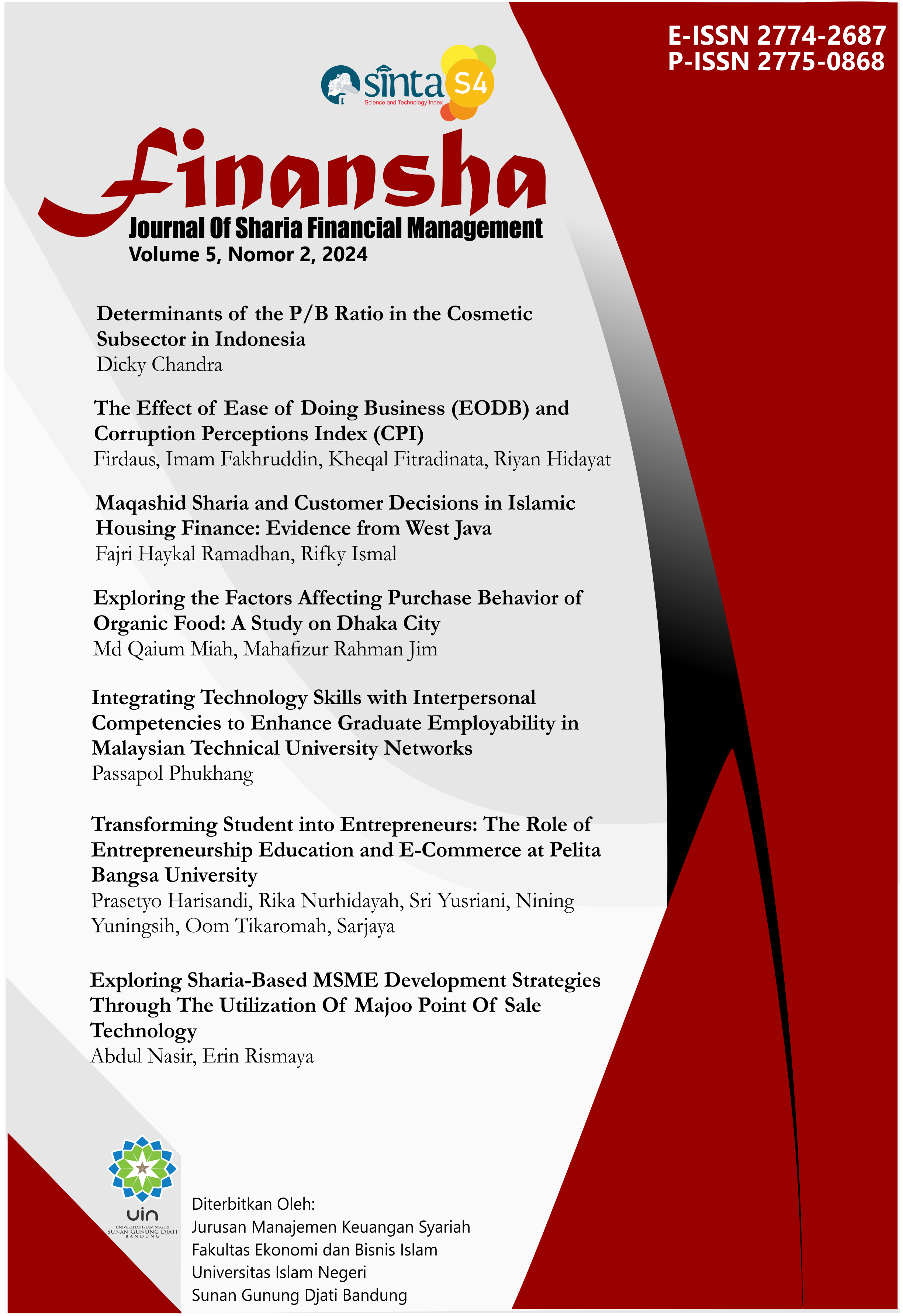INTEGRATING TECHNOLOGY SKILLS WITH INTERPERSONAL COMPETENCIES TO ENHANCE GRADUATE EMPLOYABILITY IN MALAYSIAN TECHNICAL UNIVERSITY NETWORKS
DOI:
https://doi.org/10.15575/fjsfm.v5i2.41400Keywords:
Technology skills, interpersonal competencies, graduate employability, malaysian technical university network, fourth industrial revolutionAbstract
References
Alfarauq, A. D., & Yusup, D. K. (2020). Pengaruh pengetahuan pasar modal syariah dan motivasi investasi terhadap minat investasi kaum milenial Garut di pasar modal syariah. FINANSHA: Journal of Sharia Financial Management, 1(1), 33–41.
Bandura, A. (1997). Self-efficacy: The exercise of control. W.H. Freeman.
Barrick, M. R., & Mount, M. K. (1991). The Big Five personality dimensions and job performance: A meta-analysis. Personnel Psychology, 44(1), 1–26. https://doi.org/10.1111/j.1744-6570.1991.tb00688.x
Bennett, S., & Maton, K. (2010). Beyond the “digital natives†debate: Towards a more nuanced understanding of students’ technology experiences. British Journal of Educational Technology, 41(6), 899–906. https://doi.org/10.1111/j.1467-8535.2010.01082.x
Chamorro-Premuzic, T., Furnham, A., & Lewis, M. (2010). Personality and approaches to learning predict preference for different teaching methods. Learning and Individual Differences, 20(6), 495–500. https://doi.org/10.1016/j.lindif.2010.03.003
Clarke, M. (2018). Rethinking graduate employability: The role of capital, individual attributes, and context. Studies in Higher Education, 43(11), 1923–1937. https://doi.org/10.1080/03075079.2017.1294152
Davis, F. D. (1989). Perceived usefulness, perceived ease of use, and user acceptance of information technology. MIS Quarterly, 13(3), 319–340. https://doi.org/10.2307/249008
Goleman, D. (1995). Emotional intelligence: Why it can matter more than IQ. Bantam Books.
Hasselaar, B., & Lebel, T. (2024). Realizing the potential of global digital jobs. World Economic Forum. https://www3.weforum.org/docs/WEF_Realizing_the_Potential_of_Global_Digital_Jobs_2024.pdf
Ismail, M., & Mohammed, S. M. (2015). Graduate employability and the demand for skills: A study of Malaysian technical universities. Asian Journal of Business and Accounting, 8(2), 159–180.
Judge, T. A., & Bono, J. E. (2001). Relationship of core self-evaluations traits—self-esteem, generalized self-efficacy, locus of control, and emotional stability—with job satisfaction and job performance: A meta-analysis. Journal of Applied Psychology, 86(1), 80–92. https://doi.org/10.1037/0021-9010.86.1.80
Lent, R. W., Brown, S. D., & Hackett, G. (2002). Social cognitive career theory. In D. Brown (Ed.), Career choice and development (4th ed., pp. 255–311). Jossey-Bass.
Lim, H., & Mustafa, Z. (2018). Soft skills for human capital development: A review. Journal of Economics and Management, 11(1), 33–45.
Morshidi, S., & Abdul Razak, A. (2018). Graduate employability in Malaysia: Issues and challenges. Journal of Education and Employment Studies, 4(2), 1–15.
Park, J., & Woo, S. (2021). Digital literacy and employability outcomes: The moderating role of technology. Journal of Technological Advancements, 34(3), 45–62.
Pintrich, P. R., & Schunk, D. H. (2002). Motivation in education: Theory, research, and applications (2nd ed.). Merrill/Prentice Hall.
Robles, M. M. (2012). Executive perceptions of the top 10 soft skills needed in today’s workplace. Business Communication Quarterly, 75(4), 453–465. https://doi.org/10.1177/1080569912460400
Rothwell, A., Herbert, I., & Rothwell, F. (2008). Self-perceived employability: Construction and initial validation of a scale for university students. Journal of Vocational Behavior, 73(1), 1–12. https://doi.org/10.1016/j.jvb.2007.12.002
Salas-Pilco, Z. (2020). Digital literacy and its role in employability: A review of current trends. Educational Technology Research and Development, 68(4), 1241–1256. https://doi.org/10.1007/s11423-020-09774-2
Schulz, B. (2008). The importance of soft skills: Education beyond academic knowledge. NAWA Journal of Language and Communication, 2(1), 146–154.
Teichler, U. (2015). Higher education and the world of work: Conceptual frameworks comparative perspectives, empirical findings. Springer. https://doi.org/10.1007/978-94-017-7292-2
Wan, C. D., Mansor, A., & Mohd, N. A. (2018). Bridging the skills gap: Technical and interpersonal skills in Malaysian graduates. Journal of Education and Work, 31(6), 653–662. https://doi.org/10.1080/13639080.2018.1509305
World Economic Forum. (2020). The Future of Jobs Report 2020.
https://www.weforum.org/reports/the-future-of-jobs-report-2020
World Economic Forum. (2023). The future of jobs report: Trends in soft skills and digital literacy.
Retrieved from https://www.weforum.org
Yorke, M. (2006). Employability in higher education: What it is, what it is not. Higher Education Academy.
Yorke, M., & Knight, P. T. (2004). Employability: Judging and communicating achievements. Learning and Employability Series One. Higher Education Academy.
Downloads
Published
How to Cite
Issue
Section
Citation Check
License
Authors who publish with this journal agree to the following terms:
- Authors retain copyright and grant the journal right of first publication with the work simultaneously licensed under a Creative Commons Attribution License that allows others to share the work with an acknowledgment of the work's authorship and initial publication in this journal.
- Authors are able to enter into separate, additional contractual arrangements for the non-exclusive distribution of the journal's published version of the work (e.g., post it to an institutional repository or publish it in a book), with an acknowledgment of its initial publication in this journal.
- Authors are permitted and encouraged to post their work online (e.g., in institutional repositories or on their website) prior to and during the submission process, as it can lead to productive exchanges, as well as earlier and greater citation of published work (See The Effect of Open Access).

















